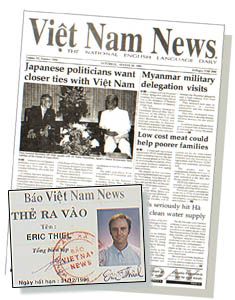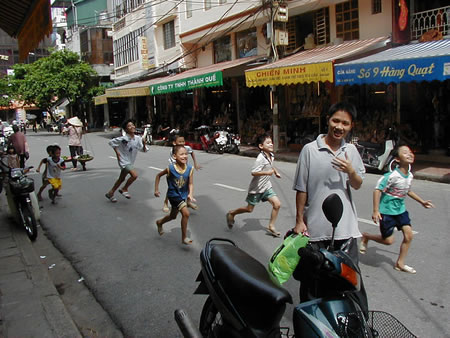Working at an Overseas English Language Newspaper
Six Years in Vietnam
Aricle and photos by Eric Thiel
1/2012

I arrived in Vietnam seeking a new direction. I had given up on a journalism career, my experience as a college newspaper editor as publisher of an “alternative weekly” too much at the fringes in a shrinking job market. With nothing to lose, I headed off to the other side of the world to teach English.
That’s where I found just the kind of challenging and meaningful work that would have taken a decade of hard career climbing to achieve in the US, even if I could find a position.
Here’s how I did it.

Vietnam News: From Skeptic to Volunteer to Staff
When I arrived in Hanoi, I earned my bread and butter (actually pho and beer) teaching English.
I was in a hotel lobby when I first saw a copy of the bedraggled Vietnam News — thin, dour, crying out for good editing and a design makeover. It was just the kind of needy project that I ordinarily would have loved. But working in the state-run media seemed to betray the ethical code of journalism. I put the idea out of my mind, and continued with the teaching.
A few months later, I was in the newsroom, a former Communist party meeting hall adorned with an immense portrait of Ho Chi Minh. An Australian friend, working as a proofreader, had convinced me to join him as a volunteer.
After chatting over cups of strong green tea, the editor handed me a story to edit. I liked the beehive of activity in the newsroom. There was a sense of comradeship and intensity. It was a lively place — far from the dour image I had in mind.
I came back the next day and soon joined the expat editorial staff. My days began at 2 p.m., as I joined the four other expat copyeditors at a row of computers and began rewriting the next day’s stories assigned by the editor-in-chief. He was a proud, silver-haired man with a mysterious if fear-inspiring presence. A gratifying wad of local currency equivalent to about $100 waited for me at the end of every week — enough to live simply but comfortably in downtown Hanoi.
An Evolving Newspaper in a Society in Transition
Although it was firmly under the auspices of the state, The Vietnam News had been granted a degree of editorial freedom and a mandate to sink or swim on its own in the new market economy, and had recently formed a joint venture with a Thai investor.
The Vietnam News stories were translated from the main Vietnamese language newspapers, such as nhan dan (The People) by dozens of young Vietnamese journalists. Making the news interesting to attract readers and thus advertising was not a tradition in Vietnam. Typically the important information was tucked near the bottom of the story and sensitive political issues shrouded in vagueness. One translator called it “Soviet style.”
The task of the expat editing staff was to transform this Soviet style writing into an inverted pyramid, with the story’s general point summarized at top and supporting information below in descending order of relevance.
This was a new concept — one of many as the media sought to evolve in the changing reality of a new market economy. There was a sense of being part of a major shift in the country, not one imposed from outside but evolving from within.
Friendships and Personal Evolution
I was also evolving from within as I got to know my Vietnamese co-workers and learned from them, in particular the power of politeness and forgiveness. One person in particular — the go-to guy to explain a particularly puzzling translation, and one of the funniest people in the newsroom — had a tragic but not uncommon story.
At 16 he became one of the thousands of soldiers moving supplies by bicycle along the Ho Chi Minh trail. Caught in an air raid, bomb fragments struck his face and destroyed an eye. He lay on a bed of leaves in the jungle for two days as the bombing continued before he could be moved for treatment.
His face was terribly scarred and his obvious glass eye illustrated the rudimentary treatment available at the time, but I never sensed any animosity toward me from him or any of the other staff who had been injured or lost a parent or sibling in the war. I was accepted with the warmth of a family member even though I must have represented some very painful experiences.
Co-workers at Vietnam News tipped me off to moonlighting jobs, such as co-hosting the Sunday Show on Voice Vietnam Radio. Every Sunday at 8 a.m. I sat nervously before a vintage Russian audio mixer and donned headphones. I had never been on the radio before. The Vietnamese host and I bantered from scripts that I had hastily edited with a pencil only moments before and could barely decipher when on the air. Although nervous at first, the host of the show quickly put me at ease — laughing as I stumbled over my words, in the quintessentially Vietnamese fashion telling me not to take things too seriously.
Indeed, she had experienced things far more serious. In her long career with Voice of Vietnam my co-host had reported from that very studio on unimaginable deprivations during wartime and the poverty that gripped the country for years afterward. Things had changed a lot in Vietnam and were continuing to change at a dizzying pace.
The Vietnam News doubled in size every year as foreign investors, development aid workers, and tourists flowed in. New businesses were popping up and construction was changing the landscape of the ancient city.
I went from editing news about rice harvests to managing my own daily lifestyle section. My weekly bundles of cash increased as well.
After three fulfilling years, I left the Vietnam News for a more lucrative position in public relations with an international aid agency. I landed the job largely due to my extensive relationships in the news media.
Although a decade has gone by, I am often reminded of the interesting nights at the Vietnam News. Iget regular Facebook updates from media comrades, most of whom have returned home to England, Australia, Canada, Singapore and elsewhere, and sometimes see a byline in the New York Times or other leading newspapers that I recognize as someone who had drifted in — and come away with a story to tell.
Eric Thiel, MA, is a writer, consultant, and social entrepreneur based in Washington, DC.
|
